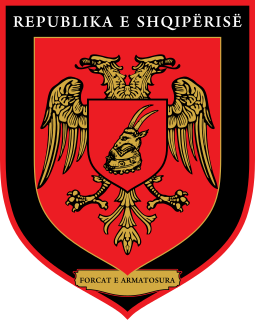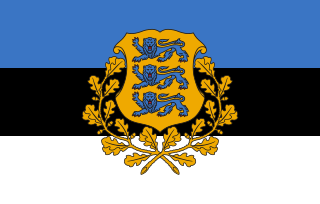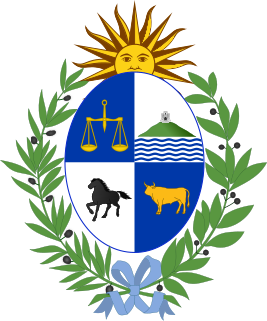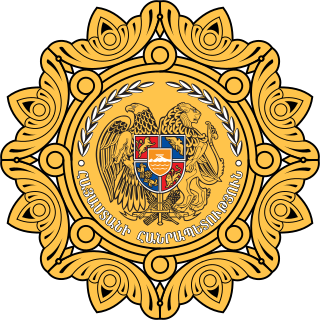A head of state is the public persona who officially embodies a state in its unity and legitimacy. Depending on the country's form of government and separation of powers, the head of state may be a ceremonial figurehead or concurrently the head of government and more.

The Albanian Armed Forces are the military of Albania and were formed after the declaration of independence in 1912. Today, it consists of: the General Staff, the Albanian Land Force, Albanian Air Force and the Albanian Naval Force.

The Government of Italy is in the form of a democratic republic, and was established by a constitution in 1948. It consists of legislative, executive, and judicial subdivisions, as well as a Head of State, or President.

The Politics of Azerbaijan takes place in a framework of a semi-presidential republic, with the President of Azerbaijan as the head of state, and the Prime Minister of Azerbaijan as head of government. Executive power is exercised by the president and the government. Legislative power is vested in both the government and parliament. The Judiciary is nominally independent of the executive and the legislature. The state system of Azerbaijan defines the Constitution of the Republic of Azerbaijan. According to the constitution, Azerbaijan is a democratic, secular, unitary republic.
The Government of Poland takes place in the framework of a unitary semi-presidential representative democratic republic, whereby the President is the head of state and the Prime Minister is the head of government.

A commander-in-chief or supreme commander is the person who exercises supreme command and control over an armed forces or a military branch. As a technical term, it refers to military competencies that reside in a country's executive leadership, a head of state or a head of government.

The president of Georgia is the constitutional head of state of Georgia as well as the supreme commander-in-chief of the Defense Forces. The president represents Georgia in foreign relations. The constitution defines the presidential office as "the guarantor of the country’s unity and national independence."

The President of the Democratic Republic of the Congo, is the head of state of the Democratic Republic of the Congo and commander-in-chief of the armed forces.

The president of the Portuguese Republic is the executive head of state of Portugal. The powers, functions and duties of prior presidential offices, and their relation with the prime minister and cabinets have over time differed with the various Portuguese constitutions.

The president of the Republic of Estonia is the head of state of the Republic of Estonia. The current president is Kersti Kaljulaid, elected by Parliament on 3 October 2016, becoming the first woman and youngest person ever to hold the position.

The president of Artsakh is the head of state and head of government of the de facto Republic of Artsakh.

Mukhtar Qapashuly Altynbayev served as the Minister of Defense and General of the Army of Kazakhstan twice, most recently from December 2001 to 10 January 2007. Prime Minister Karim Massimov replaced him with former Prime Minister Daniyal Akhmetov in a political shakeup.

The Constitution of Kosovo, refers to the supreme law of the Republic of Kosovo. Article four of the constitution establishes the rules and separate powers of the three branches of the government. The unicameral Assembly of the Republic exercises the legislative power, the executive branch led by the President and the Prime Minister which are responsible for implementing laws and the judicial system headed by the Supreme Court.

The Constitution of Armenia was adopted by a nationwide Armenian referendum on July 5, 1995. This constitution established Armenia as a democratic, sovereign, social, and constitutional state. Yerevan is defined as the state's capital. Power is vested in its citizens, who exercise it directly through the election of government representatives. Decisions related to changes in constitutional status or to an alteration of borders are subject to a vote of the citizens of Armenia exercised in a referendum. There are 117 articles in the 1995 constitution. On November 27, 2005, a nationwide constitutional referendum was held and an amended constitution was adopted. The constitution was amended again in a national referendum on December 6, 2015 that changed the political structure from a semi-presidential system to a parliamentary republic.
The federal government of Iraq is defined under the current Constitution, approved in 2005, as an Islamic, democratic, federal parliamentary republic. The federal government is composed of the executive, legislative, and judicial branches, as well as numerous independent commissions.

The Supreme Commander-in-Chief of the Armed Forces of the Russian Federation is the ultimate commanding authority of the Russian Armed Forces, an executive role vested in the President of Russia in accordance with Article 87 of the Constitution.

A constitutional referendum was held in Uruguay on 30 November 1980. Although the new constitution drafted by the military regime was rejected by voters, some of its proposals were implemented anyway.

The president of Armenia is the head of state and the guarantor of independence and territorial integrity of Armenia elected to a single seven year term by the National Assembly of Armenia. Under Armenia's parliamentary system, the president is simply a figurehead and holds ceremonial duties, with most of the political power vested in the Parliament and Prime Minister.

The Armed Forces General Staff, or EMGFA, is the supreme military body of Portugal. It is responsible for the planning, command and control of the Portuguese Armed Forces.

The 1973 Constitution of the Syrian Arab Republic was adopted on 13 March 1973 and was in use until 27 February 2012. It describes Syria's character to be Arab, democratic, and republican. Further, in line with pan-Arab ideology, it positions the country as a region of the wider Arab world and its people as an integral part of the Arab nation. It entrenched the power of the Arab Socialist Ba'ath Party, its Article 8 describing the party as "the leading party in the society and the state", even if Syria was not, as is often believed, a one-party system in formal terms.

















